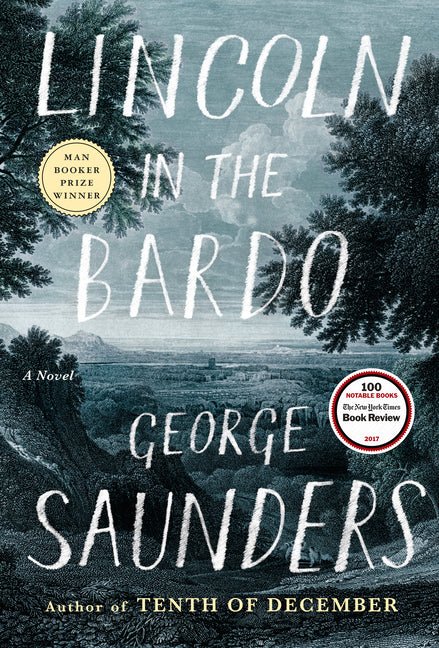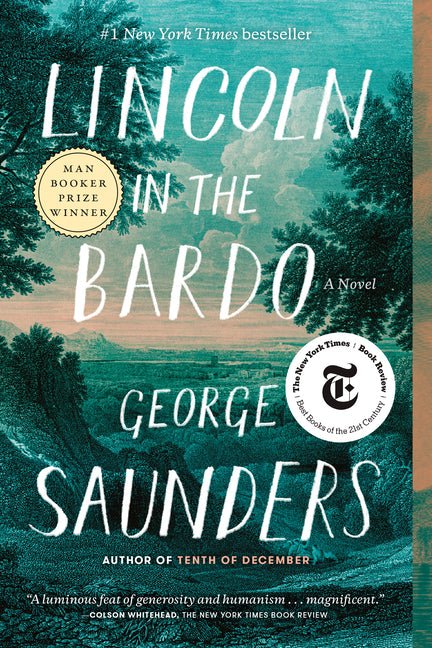Lincoln in the Bardo
by George Saunders
*When you open this audiobook on Libro.fm, be sure to select Aveson as your bookstore so that your purchase supports local literacy programs and tree‑planting.
Couldn't load pickup availability
#1 NEW YORK TIMES BESTSELLER - WINNER OF THE MAN BOOKER PRIZE
The "devastatingly moving" (People) first novel from the author of Tenth of December a moving and original father-son story featuring none other than Abraham Lincoln, as well as an unforgettable cast of supporting characters, living and dead, historical and invented
One of The New York Times's 100 Best Books of the 21st Century - One of The Atlantic's Great American Novels of the Past 100 Years - One of Paste's Best Novels of the Decade
Named One of the Ten Best Books of the Year by The Washington Post, USA Today, and Maureen Corrigan, NPR - One of Time's Ten Best Novels of the Year - A New York Times Notable Book - One of O: The Oprah Magazine's Best Books of the Year
February 1862. The Civil War is less than one year old. The fighting has begun in earnest, and the nation has begun to realize it is in for a long, bloody struggle. Meanwhile, President Lincoln's beloved eleven-year-old son, Willie, lies upstairs in the White House, gravely ill. In a matter of days, despite predictions of a recovery, Willie dies and is laid to rest in a Georgetown cemetery. "My poor boy, he was too good for this earth," the president says at the time. "God has called him home." Newspapers report that a grief-stricken Lincoln returns, alone, to the crypt several times to hold his boy's body.
From that seed of historical truth, George Saunders spins an unforgettable story of familial love and loss that breaks free of its realistic, historical framework into a supernatural realm both hilarious and terrifying. Willie Lincoln finds himself in a strange purgatory where ghosts mingle, gripe, commiserate, quarrel, and enact bizarre acts of penance. Within this transitional state--called, in the Tibetan tradition, the bardo--a monumental struggle erupts over young Willie's soul.
Lincoln in the Bardo is an astonishing feat of imagination and a bold step forward from one of the most important and influential writers of his generation. Formally daring, generous in spirit, deeply concerned with matters of the heart, it is a testament to fiction's ability to speak honestly and powerfully to the things that really matter to us. Saunders has invented a thrilling new form that deploys a kaleidoscopic, theatrical panorama of voices to ask a timeless, profound question: How do we live and love when we know that everything we love must end?
"A luminous feat of generosity and humanism."--Colson Whitehead, The New York Times Book Review
"A masterpiece."--Zadie Smith
Share
Book Details
ISBN:
9780812995343
EAN:
9780812995343
Binding:
Hardcover
Pages:
368
Authors:
George Saunders
Publisher:
Random House


His writing takes you straight to Jhana 1: deep-hearted, loving, compassionate voice.More teens would like English class if Saunders was in it.
My favorite book. I do have several favorites, but this is on the top of the list. I read many lukewarm reviews (after reading the book) and... maybe, like me, you need to be interested in history (particularly Lincoln's life and times) and have a warm feeling for old cemeteries and love reading (and then researching) footnotes and annotations. If not, try something else.
Purchased as a gift.
I had no idea what to expect here, and it took some doing to get used to the format. But having done so the book flowed beautifully, and showed itself to be a poignant and unique historical fiction novel. A new favorite? No. But enough to push me toward more of Saunders' work. Some of his non-fiction next, I think.'And as the sun came up, we prayed, each within ourselves, our usual prayer... To still be here when the sun next set… And discover, in those first moments of restored movement, that we had again been granted the great mother-gift… Time. More time.'
Where to start? I love George Saunders and have read just about everything, including his kids books. I could barely get through this one. Like another reviewer said, I agree with The Atlantic review of this, mostly. And unlike what a lot of folks have said, I did not find this touching, endearing, or filled with pathos. I did not find it a stunning portrayal of a father and president’s loss. It’s a frustrating, bewildering read - like watching a beloved teacher fall to his death down a long flight of stairs while dressed, inexplicably, in a clown suit and then slamming to his final rest on a whoopie cushion that emits a loud fart noise to a stunned audience. Did we just witness something terrible, hilarious, rotten, amazing? I have so many questions - mostly WHY?So basically, I found it a disappointing portrayal peppered with absurdity, a circus cast of characters, odd juxtapositions, a mishmash. It’s like the literati kidnapped Saunders to turn a writer into a writer - there was just no need - and it failed. Was it over or under edited? I’m not sure.To me what makes Saunders a genius is his unique understanding of the way capitalism threatens, warps, and harms our humanity. The best of his Everyman characters persist, often holding on to ever smaller shreds of dignity that they must trade to simply exist, never mind function. We feel for them, we see ourselves in them to some extent at least. There is a sense that our collective nostalgia for the way things used to be (or more accurately, the way we thought they used to be) could be used against us and destroy us. Our delusions are in fact deeply harmful. Unvarnished truth and that shrinking humanity is all we’ve got to save us - and the odds ain’t great.This book also deals with such delusions - this time of bardo purgatory, where Willie Lincoln must hear the cold hard truth of his father that Willie is dead, even as Abe founders in his own denial and delusions even forgetting Tad, his living son, for a bit. And we do watch as truth and the difficult acceptance of it eventually frees these characters, just as the acceptance of the horrifying truths of slavery and war for freedom eventually free the living. And Lincoln, the father, is therefore elevated as righteous truth teller… BUT… the absurdist cast of characters, like a Greek chorus of deplorables and the quotes - real and imagined - make this virtually unreadable. It’s like chaotic slapstick or a weird laugh track over a funeral.Idk, maybe I’m being overly harsh. I just had high hopes for another haunting waltz through American delusions with a treatment that affirmed, we are much more than this, and that coming through the bardo to the other side means something after all.



